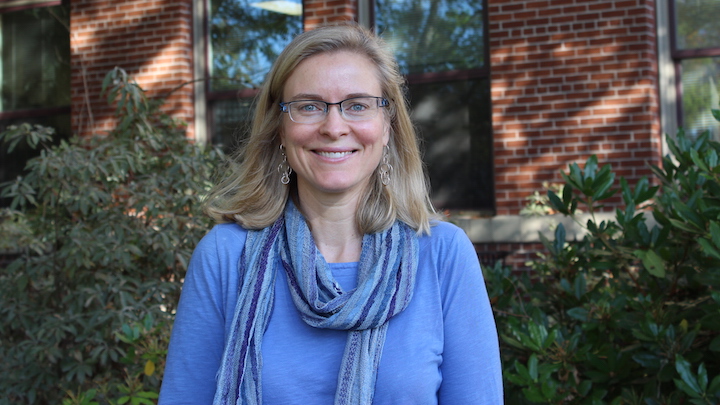It’s not unusual for someone receiving professional accolades to pay tribute to their alma mater, but Mary Beisiegel is unequivocal about the impact her time at the University of Alberta had on her professional life.
“Before coming to the U of A, I was a pretty traditional teacher. I think a big part of why I teach the way I do is because of my experience at the U of A,” says Beisiegel, who completed her PhD in the Faculty of Education in 2009. “I imagine if I had gone to another doctoral program my teaching would have changed anyway, but I think there was something really mind-opening about my experience at the U of A that I don’t think I would have gotten anywhere else.”
Beisiegel, a professor of mathematics education at Oregon State University, has received the Henry L. Alder Award from the Mathematical Association of America, which recognizes a college or university faculty member early in their career whose teaching of undergraduate mathematics “has been extraordinarily successful” and “is shown to have influence beyond their own classroom.”
The road to national recognition as a mathematics educator was hardly straight for Beisiegel, who failed calculus as a first-year psychology major at Portland State University. After getting the hang of calculus and eventually earning a master’s degree in mathematics from Virginia Tech, Beisiegel followed her Alberta-born husband Dave to Edmonton and decided to pursue a master’s degree in statistics at the U of A. Though she earned a graduate student teaching award, she also realized statistics might not be her true calling.
“I thought ‘what do I really love, what do I want to do every day?’ and it was going back to mathematics,” Beisiegel says. “I wanted to teach and talk about math, but more importantly I wanted to learn about how people teach and learn math.”
Beisiegel says it was in her first class with elementary education professor Lynn McGarvey where she realized pursuing her PhD in mathematics education was the right decision. McGarvey wrote a simple addition problem on the board, then got students to show how they arrived at the solution. Among a class of 16, there were no fewer than eight different methods used.
“It hit me like a ton of bricks—there’s so much more to mathematics I never thought of before. If you think about that as a teacher, if you know all those different approaches, you can offer your students so much more,” Beisiegel says. “That was the first of many, many experiences that made mathematics so much more interesting and fun to play with and think about different ways to represent that would be so beneficial for students.”
In her own classroom, Beisiegel encourages prospective math educators by practicing what she preaches—she emphasizes active learning, limiting lectures to make time for doing math in class, allowing students to arrive at solutions themselves, and revisiting her own methods and pedagogy frequently. Elaine Simmt, who was her doctoral supervisor at the U of A, says Beisiegel was committed to this approach early on.
“I was not surprised to learn that Mary had won this award but I am extremely pleased she did. She understands that the university instructor has a responsibility to create spaces for her students to learn. Her empathy for learners is evident not only in her teaching but in the choices she makes for her research,” Simmt says.
“In her doctoral research she explored the experiences of graduate students in mathematics with respect to teaching as an aspect of their work. From that work she was able to contribute to the discourse on how mathematicians can be better prepared for teaching as part of their careers in universities and colleges.”
Beisiegel’s contributions aren’t limited to teaching and research. She and her husband have given back to the U of A in a very tangible way by helping to fund a mathematics education scholarship in memory of Julie Long, a fellow doctoral student and friend of Beisiegel’s who became a professor in the Faculty of Education. Long passed away in March of 2016 from cancer. The Beisiegels’ donation provided much of the endowment required to provide an annual award in Long’s name in perpetuity.
“She was a fantastic human being and so passionate about mathematics and learners. She was a really patient and gracious and funny and warm and I learned a lot from her,” Beisiegel says. “I just thought people needed to remember this really special person who I felt contributed a lot to the math education community at the U of A.
“It’s just so exciting that every year, from now on, someone will get the Dr. Julie Long Graduate Scholarship in Mathematics Education. She had two little boys and I hope that one day they’ll know about it, and know that she had so many family and friends who loved her who wanted her memory to continue on.”
